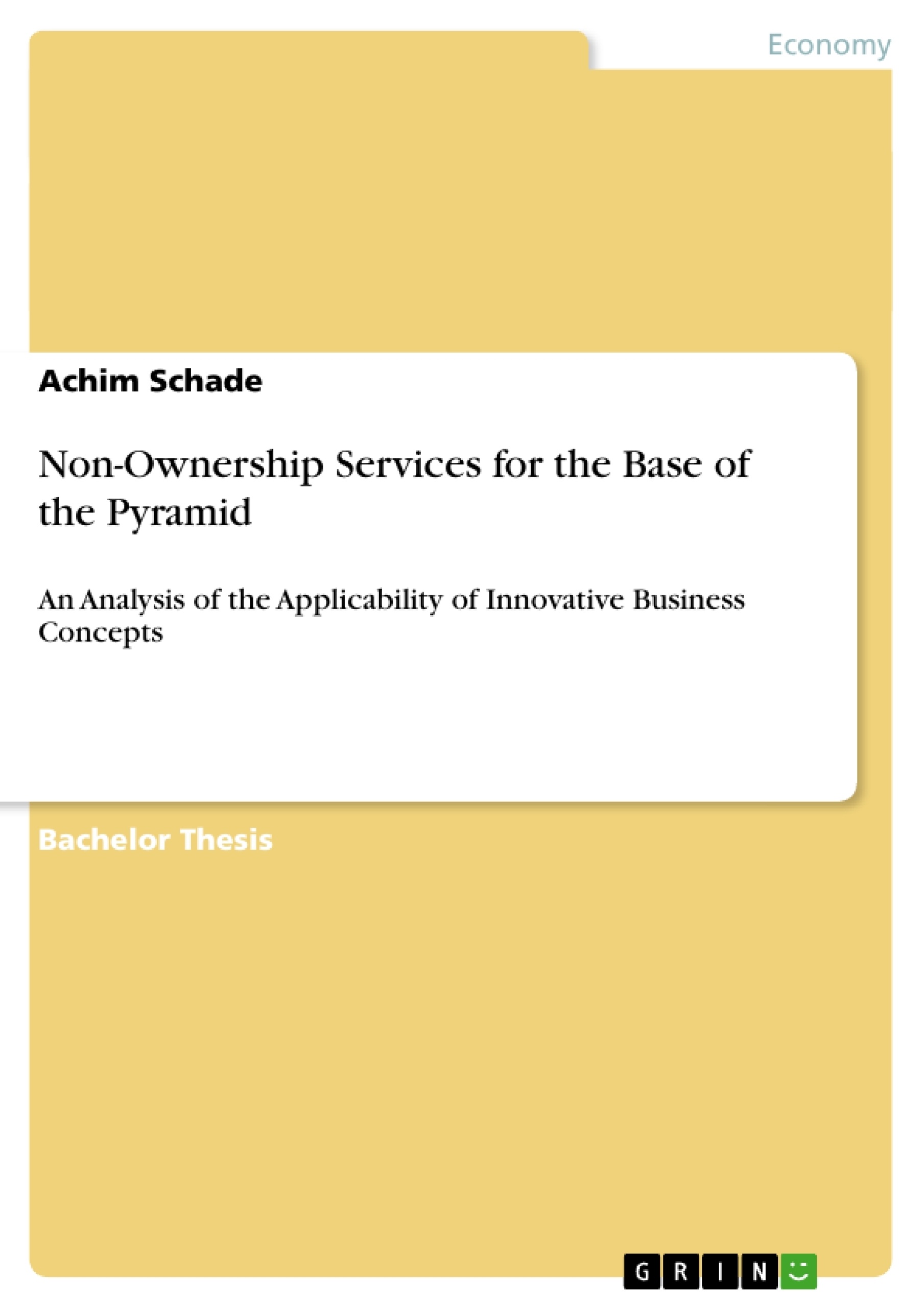An analysis of the applicability of NOS for the BoP in emerging markets is the goal of this thesis. A conceptual classification of NOS is developed and the BoP as potential market is identified to enable this analysis. The applicability is investigated through an identification of successful business concepts in developed and emerging markets and an imaginary transfer of concepts from developed to emerging markets, based on previously identified entry potentials.
In order to base the analysis on a solid conceptual framework, first, the shift from a goods-dominated (G-D) to a service-dominated (S-D) logic and the connected concept of value co-creation is demonstrated referring to existing literature. Furthermore, the concept of NOS is characterized and defined as conceptual framework for the following analysis. Moreover, a typology of NOS is developed to systematically categorize existing concepts. Second, the BoP is identified as potential target market for the application of NOS by defining and characterizing the market perspective and referring to underlying market data. Special aspects to be concerned while doing business at the BoP and specific needs of BoP consumers are also elaborated on for the applicability of NOS. Third, to systematically transfer the concept, successful NOS business models in developed markets are analyzed and classified as well as successful concepts at the BoP based on the developed conceptual framework to demonstrate current developments. Here, additionally, market entry potential through possible shortcomings is investigated. Based on this potential market entry wedges, identified concepts are transferred from developed markets to the BoP. Finally, implications for different stakeholders are derived, limitations and future directions elaborated, and the results of the analysis summarized in the concluding part of this thesis.
Inhaltsverzeichnis (Table of Contents)
- Introduction
- Purpose of the Study, Problem Definition and Objective
- Course of Investigation
- Concept of Service-Dominant Logic and Non-Ownership Services
- The Shift from Goods-Dominant to Service-Dominant Logic
- Value Co-Creation through Service
- Non-Ownership Service Definition, Characterization and Typology
- Service Characteristics
- Non-ownership and Non-Ownership Services
- Definition of Non-Ownership Services
- Characterization and Terminological Differentiation of Non-Ownership Services
- Typology of NOS
- Base of the Pyramid – a Potential Target Market
- Defining the Base of the Pyramid
- Market Data
- Mass Market vs. Multiple Market Niches
- Doing Business at the Base of the Pyramid
- Special Characteristics of Base of the Pyramid Markets
- Challenges and Constraints
- Entrepreneurship at the Base of the Pyramid
- Business Concepts and Market Entry at the Base of the Pyramid
- Specific Needs at the Base of the Pyramid
- Transferring a Business Model: Non-Ownership Services at the Base of the Pyramid
- Non-Ownership Services as Business Concept in Developed Markets
- Reasons and Motivations for Non-Ownership Services
- Current Development and Competitive Advantages
- Overview of Existing Concepts
- Non-Ownership Services as Business Concept in Developing Markets
- Reasons and Motivations for Non-Ownership Services
- Existing Businesses
- Competitive Advantages and Entry Potential
- Transfer of Business Models
- Implications, Limitations and Future Directions
- Implications
- Limitations and Suggestions for Further Research
- Conclusion
Zielsetzung und Themenschwerpunkte (Objectives and Key Themes)
This bachelor thesis explores the potential of non-ownership services as a business concept for the Base of the Pyramid (BOP) market. The work aims to analyze the current development and competitive advantages of non-ownership services in developed markets, assess their applicability in developing economies, and identify key challenges and opportunities for their implementation within the BOP context.- Service-Dominant Logic and its implications for non-ownership services.
- The characteristics and typology of non-ownership services.
- The Base of the Pyramid as a potential target market for non-ownership services.
- The challenges and opportunities of transferring business models of non-ownership services to the BOP market.
- Implications for future research and development in the field of non-ownership services for the BOP.
Zusammenfassung der Kapitel (Chapter Summaries)
- The introductory chapter lays out the purpose, problem definition, and objective of the study, outlining the course of investigation.
- Chapter two delves into the concept of Service-Dominant Logic, contrasting it with the Goods-Dominant Logic. It introduces the concept of value co-creation through services and provides a definition, characterization, and typology of non-ownership services.
- Chapter three focuses on the Base of the Pyramid (BOP) market, defining its characteristics, market data, and business opportunities. It explores specific needs and challenges within this market segment.
- Chapter four analyzes the transferability of non-ownership service business models from developed markets to the BOP context. It examines existing business concepts, reasons and motivations for non-ownership services, and competitive advantages in both developed and developing markets.
- Chapter five discusses implications, limitations, and future directions for research related to non-ownership services at the Base of the Pyramid.
Schlüsselwörter (Keywords)
This research focuses on the intersection of service-dominant logic, non-ownership services, and the Base of the Pyramid market. It explores the potential of non-ownership service models as a means of delivering value and achieving sustainable development within developing economies. Key concepts include value co-creation, non-ownership, business model transferability, and market entry strategies for the BOP market.- Quote paper
- Achim Schade (Author), 2012, Non-Ownership Services for the Base of the Pyramid, Munich, GRIN Verlag, https://www.grin.com/document/193685



